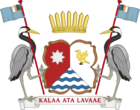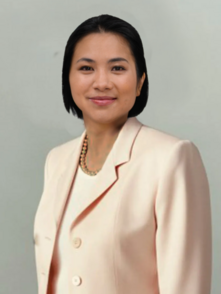Head of Government of Freice
| Head of Government of the Country of Freice Raioa oe Kuwanaara oe te ma Landua oe Faio | |
|---|---|
 | |
| Style | The Honourable (formal, domestic) Her Excellency (diplomatic) |
| Status | Head of Government |
| Member of | |
| Residence | Potio Kaimo, Sekapa |
| Appointer | President of the Kivunna |
| Term length | 1 year, renewable |
| Constituting instrument | Constitution of Freice |
| Precursor | Leader of the Government Council[a] |
| Formation | 11 April 2022 |
| First holder | Aniara Neileka |
| Deputy | Deputy Prime Minister |
| Website | kuwanaara.faio/raioa |
 |
|---|
| This article is part of a series on the politics and government of Freice |
|
The Head of Government of the Country of Freice (Freician: Raioa oe Kuwanaara oe te ma Landua oe Faio), alternatively and unofficially known as the Prime Minister of Freice is the head of government of Freice.
Freice, a Country of Riamo pursues a system comparable to presidentialism, whereby the prime minister is head of the executive branch and independent from the legislative branch. As head of government, they are the highest executive official, with extensive political responsibilities including chairing the Government Council, signing bills into law, administering Freice's external affairs policy, and representing Freice internationally.[1] The prime minister is an ex officio member of the Kivunna (the legislature), deviating from pure presidentialism, although they do not have a vote and cannot be removed by a vote of no confidence.[1]
The office was established with the passage of the Constitution of Freice in April 2022, which separated the positions of head of government and presiding officer of the legislature.[2] The creation of the post marks Freice's transition from a parliamentary to a presidential system of government. The prime minister is directly-elected every year. The first and incumbent prime minister is Aniara Neileka, who has served since 11 April 2022.[3] Neileka previously served as President of the Island Meeting from 20 January 2022.[4]
History
Pre-2022
On the passage of the first Freician constitution in 1972, the head of government was the president of the Assembly of Delegates, which combined the duties of government leader and legislative speaker.[5] The office was held alongside the position of Chair of the Senior Council, which served as the cabinet and executive body. With the granting of certain foreign policy powers to the Freician government in 1980, the president also discharged the duties of foreign minister de facto.
Under this system, the Freician government largely operated on a consensus basis. The president usually acted on the principle of unanimity in the Senior Council and in the wider Assembly, relying on a consent base of support to maintain their position within the assembly. This produced, based on the individual president, governments of varying stability.
Successive laws gradually increased the powers of the presidency. Initially, the president was largely restricted in their actions by what the Assembly approved. The Executive Powers (Leader of the Senior Council) Act 1978 gave the president the power to issue decrees in matters provided for by law, which were enforceable like acts of the Assembly.[6] The Government of Freice (Legislative Powers) Act 1981 reduced the powers of the Assembly in relation to the Senior Council, giving it (and therefore the president) the right to conduct relations with foreign governments in its own right, rather than as a committee of the Assembly.[7]
In the early 2000s, the presidency was given further powers akin to that of a traditional head of government. They were given greater powers in determining government policy and revoked the principle of first-amongst-equals that had governed the position since 1972.[8]
Post-2022
With the passage of the new constitution, the presidency was detached from the legislature, with the separate position of prime minister established. No longer was the position both presiding officer and head of government, nor elected as a member of the legislature. With this evolution, the office was no longer an intermediary between different factions within the legislature, as was largely the case before, but now enjoyed a more active role within government.[3] For the first time, it was described in law as the "head of the government of the state" rather than its previous role as the "presiding officer of the body of executive power" - a more ambiguous description.[9]
The first holder of the office, Aniara Neileka, assumed the position in an acting capacity on its founding. In accordance with the constitution, the office is elected by the people: "The Head of Government is elected by eligible voters on an annual basis by an absolute majority of voters."[10] As such, the only permanent officeholders permitted by the constitution are those elected.[4]
Election
Qualifications
A candidate for prime minister is required to meet the following requirements to be eligible:[11]
- Be at least eighteen years of age
- Be a registered voter
- Possess Riamese citizenship and Freician nationality
- Be a permanent resident of Freice for at least five years at the time of election
Vote
The prime minister of Freice is directly elected by double simultaneous voting for a renewable term of one year. Each party or political grouping meeting certain conditions nominates an individual to be their prime ministerial candidate (formally, Kaitaidatano Ainuaheruma Raioa, "Leading Executive Candidate"). The candidate who's party wins the most seats is elected.[12] There are no term limits. Previously, the prime minister was directly elected in a two-round system; this only occurred once before a constitutional amendment replaced the system.[13]
Oath or affirmation
Upon their election, prime ministers are required to take two oaths or affirmations. The first is known as the Federal Oath:
I, "name", do solemnly swear (or affirm) true faith and allegiance to the Federal Constitution of the Riamese Federation and to all laws, customs, and usages therein provided, and to recognise Her Majesty Queen Diana The Second, Her heirs and successors, as Head of the Associated States of the Federation. [So help me God.][14]
The second is the oath of office:
I [Insert Name] do solemnly declare my allegiance to the Constitution of the Country of Freice and to all laws, customs, and usages therein; that I will discharge my duties as Head of Government with good faith and integrity of mind and soul; that I will serve all the people of Freice without preference nor prejudice, to observe and uphold their rights and freedoms, and to maintain their democratic institutions; and that I will, in all things, be a faithful and true servant to the people and their laws. This I do swear/affirm.[14]
Powers and Responsibilities
Executive powers
The prime minister, according to the Constitution of Freice, is responsible for "directing the day-to-day governance of the State"[15] The prime minister is Freice's chief executive and leads the executive branch. In this capacity, they appoint ministers to the Government Council, with the advice and consent of the Kivunna, and may request their removal.[16]
The prime minister is responsible for overseeing the organisation of the island's government. As such, they may issue directives establishing new positions in the Government Council. However, they may not dissolve any position without the consent of the Kivunna. Under the constitution, the prime minister is also empowered to propose constitutional amendments (along with the Kivunna).[17] Ministers in the government are accountable to the prime minister, as well as the Kivunna, and work to implement the prime minister's policies.
The prime minister is also Commissioner-in-Chief of the Freice Police Service, a position akin to the commander-in-chief of the armed forces. This is not a rank and does not enable the prime minister to wear a uniform, but is rather a largely ceremonial position that enables them to appoint the Commissioner of Police with the approval of the Kivunna.
Legislative powers
As Freice's regional head of state, the prime minister is responsible for granting assent to all bills passed by the Kivunna. The prime minister may withhold consent (effectively veto a bill) by returning it to the Kivunna for amendments.[18] If they do not return the bill to the Kivunna or grant assent within ten days of it being presented to them, the bill automatically becomes law.[19][16]
The prime minister is responsible for calling the Kivunna into session, which they must do within one month of its election.[20][21] They also have the limited power to prorogue and dissolve the Kivunna, which they may only do under certain circumstances: when it has reached the end of its term, or when it has elected to dissolve itself.[22]
The prime minister makes formal reports to the Kivunna on the operations of government, and makes an annual address to the legislature announcing the government's program for the next year. This is done on the invitation of the President of the Kivunna.[16]
Judicial powers
The prime minister's role within the judiciary is largely limited to appointing its members. Judges of the Court of Appeal and the High Court are appointed by the prime minister on the advice of the Judiciary Appointments Council and with the consent of the Kivunna. The council recommends individuals, with the prime minister at liberty to choose any person from this list.[16]
Whilst the prime minister does not possess the power to issue commutations, pardons, or paroles in their own right, they have the ultimate right to accept or reject any recommendations made by the minister of justice.[23] The prime minister is empowered to do so when the Kivunna approves any proposal for clemency.
Succession
The Constitution of Freice outlines the process of succeeding to the presidency in the event that the prime minister leaves office prior to the conclusion of their term or is otherwise unable to exercise their duties. Succession to the office is on a temporary basis under the constitution, with each successor serving as acting prime minister only.
The President of the Kivunna is the first-in-line in the line of succession; if they are unable to execute the office in the interim, the Vice-President of the Kivunna may issue an emergency order appointing an acting prime minister.[24]
Unlike in most states, ministers do not automatically succeed to the presidency. This is, in part, because they were appointed by and answerable to the Kivunna, and partly because a prime minister must be directly elected by the people.[25]
List of prime ministers
| Prime Minister | Took office | Left office | Party | Notes | |||
|---|---|---|---|---|---|---|---|
| 1 | 
|
Aniara Neileka February 3, 1982 |
April 11, 2022 | Incumbent | MURO Alliance | [b] | |
See also
References
- ↑ 1.0 1.1 "Government Council > Prime Minister". Government of Freice. Retrieved 14 April 2022.
- ↑ "Meeting approves constitution draft". Radio and Television Freice. Retrieved 2 April 2022.
- ↑ 3.0 3.1 "Meeting approves constitution draft". Radio and Television Freice. Retrieved 3 April 2022.
- ↑ 4.0 4.1 "Neileka elected President". Radio and Television Freice. Retrieved 20 January 2022.
- ↑ "Constitution Act 1972" (PDF). Government of Freice. Retrieved 7 June 2018.
- ↑ "Executive Powers (Leader of the Senior Council) Act 1978" (PDF). Government of Freice. Retrieved 19 December 2015.
- ↑ "Executive Powers (Leader of the Senior Council) Act 1978" (PDF). Government of Freice. Retrieved 16 December 2015.
- ↑ "President seeks additional powers". Tama Adune oe Faio. Retrieved 12 January 2017.
- ↑ "Freice ends political conflict". Santa Elisa Live. Retrieved 4 April 2022.
- ↑ "Constitution of the Country of Freice - Section 4, Part 24" (PDF). Government of Freice. Retrieved 15 April 2022.
- ↑ "Qualifications and requirements for election to the position of Head of Government" (PDF). Government of Freice. Retrieved 13 April 2022.
- ↑ "Constitution of Freice - Section 32(2)". Kivunna. 19 June 2022. Retrieved 29 September 2022.
- ↑ "Results of the Prime Ministerial Election, June 2022" (PDF). Electoral Council of Freice. 10 June 2022. Retrieved 13 June 2022.
- ↑ 14.0 14.1 "Elections and Oaths Amendment Act 2022" (PDF). Government of Freice. Retrieved 25 April 2022.
- ↑ "Constitution of the Country of Freice - Section 4, Part 2(a)" (PDF). Government of Freice. Retrieved 21 April 2022.
- ↑ 16.0 16.1 16.2 16.3 "Freice: What does the prime minister do?". Riamese Broadcasting Corporation. Retrieved 19 April 2022.
- ↑ "Constitution of the Country of Freice - Section 4, Part 31(2)" (PDF). Government of Freice. Retrieved 15 April 2022.
- ↑ "Constitution of the Country of Freice - Section 3, Part 21(6)" (PDF). Government of Freice. Retrieved 21 April 2022.
- ↑ "Constitution of the Country of Freice - Section 3, Part 21(7)" (PDF). Government of Freice. Retrieved 21 April 2022.
- ↑ "Freice constitution: separation of powers comes to Freice". Riamo News. Retrieved 4 April 2022.
- ↑ "Constitution of the Country of Freice - Part 4, Section 28(3)" (PDF). Government of Freice. Retrieved 21 April 2022.
- ↑ "Dissolution of the Kivunna Act, 2022" (PDF). Government of Freice. Retrieved 18 July 2022.
- ↑ "Constitution of the Country of Freice - Part 4, Section 28(2)(h)(iv)" (PDF). Government of Freice. Retrieved 21 April 2022.
- ↑ "Constitution of the Country of Freice - Part 4, Section 26(1)" (PDF). Government of Freice. Retrieved 21 April 2022.
- ↑ "Government Council Succession (Regulations) Order 2022" (PDF). Government of Freice. Retrieved 22 April 2022.
Notes
External links

